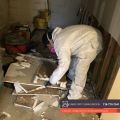The Dangers of Mold After a Flood

Floods are natural disasters that can cause extensive damage to homes and properties. Apart from the immediate destruction caused by rising waters, floods can also lead to long-term issues, such as mold growth. Mold is a type of fungus that thrives in damp and humid conditions, and flooded homes provide the ideal environment for mold spores to germinate and spread rapidly. Understanding the dangers of mold after a flood is essential for homeowners to take prompt and effective measures to mitigate its impact. In this article, we will explore the potential dangers of mold growth after a flood and the importance of professional mold inspection, testing and remediation to restore a safe and healthy living environment.
Rapid Mold Growth
After a flood, standing water and residual moisture create the perfect breeding ground for mold. Mold spores are present in the air and on surfaces, and when they come into contact with moisture, they can quickly multiply and form mold colonies. Within 24 to 48 hours of exposure to water, mold can begin to grow and spread throughout the affected area.
Structural Damage
Mold can cause significant damage to building materials, leading to weakened structures and compromised integrity. As mold grows on organic materials like wood, drywall, and insulation, it breaks them down and deteriorates their strength. This structural damage can lead to costly repairs and pose safety risks to occupants.
One of the most significant dangers of mold after a flood is the potential health risks it poses to individuals living in the affected property. Mold releases airborne spores and mycotoxins, which can be inhaled or come into contact with the skin. For many people, exposure to mold spores and mycotoxins can lead to a range of health issues, including:
- Respiratory problems: Coughing, wheezing, and exacerbation of asthma symptoms.
- Allergic reactions: Sneezing, runny nose, itchy eyes, and skin rashes.
- Irritation of the eyes, nose, throat, and skin.
Fatigue and headaches.
People with pre-existing respiratory conditions, allergies, or weakened immune systems are more susceptible to mold-related health problems.
Spread to Unaffected Areas
Mold spores are lightweight and easily dispersed by air currents. If not addressed promptly, mold can spread to unaffected areas of the property, leading to more extensive infestations. Mold growth can occur behind walls, under flooring, and in hidden spaces, making detection and containment challenging without professional expertise.
Long-Term Effects
If mold is left untreated after a flood, it can have long-term consequences on indoor air quality and property value. Mold can persistently release spores and mycotoxins into the air, affecting the respiratory health of occupants and making the property uninhabitable for some individuals. Moreover, when potential buyers or renters discover a history of mold issues, it can significantly impact the property's marketability.
Insurance Coverage
Homeowners' insurance policies may cover certain types of flood damage, but they often have limitations on mold remediation coverage. It is essential for homeowners to understand their insurance policies and seek appropriate coverage for mold remediation to avoid costly out-of-pocket expenses.
The Importance of Professional Mold Remediation
Given the dangers of mold after a flood, professional mold remediation is crucial to ensure a thorough and safe removal process. Here's why professional remediation is essential:
Expert Assessment: Certified mold remediation experts can assess the extent of mold growth and identify hidden areas of infestation.
Safety Measures: Professionals follow industry best practices to contain mold spores and prevent cross-contamination during the removal process.
Proper Equipment: Mold remediation companies use specialized equipment, such as air scrubbers and dehumidifiers, to effectively remove mold and restore indoor air quality.
Complete Removal: Professionals ensure that all mold colonies and spores are thoroughly removed, reducing the risk of recurrence.
Preventive Measures: Mold remediation experts can provide recommendations and implement preventive measures to mitigate future mold growth.
Conclusion
The dangers of mold after a flood are significant and can have adverse effects on both the property and the health of its occupants. Prompt action is crucial to prevent mold from spreading and causing further damage. Professional mold inspection, mold testing and mold remediation services are essential to effectively remove mold, restore indoor air quality, and ensure a safe and healthy living environment. If your home has been affected by a flood, it's essential to contact certified mold experts like Bay Area Mold Pros to assess the situation and provide comprehensive remediation to protect your property and your loved ones.
Bayareamoldpros is a leading mold inspection and mold testing company providing quality mold analysis services and helping families & businesses overcome the devastating setbacks caused by mold. Bay Area Mold Pros suggests every homeowner in the San Francisco area should get periodic mold inspections. To schedule our mold inspection & mold testing services visit our website bayareamoldpros.com either email us or fill in the contact form on our website. We can be reached 24/7 at (650)762-6228.





